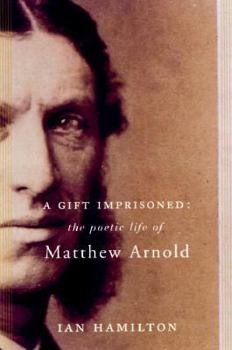A Gift Imprisoned: The Poetic Life of Matthew Arnold
Select Format
Select Condition 
Book Overview
English poet Matthew Arnold had two lives. In his youth, he was an impassioned lyric poet. In his later years, he was Victorian England's best-known social prophet, educational reformer, and literary... This description may be from another edition of this product.
Format:Hardcover
Language:English
ISBN:0465044212
ISBN13:9780465044214
Release Date:February 1999
Publisher:Basic Books
Length:256 Pages
Weight:0.95 lbs.
Dimensions:1.0" x 8.5" x 5.8"
Customer Reviews
3 ratings
First-Rate Biography
Published by Thriftbooks.com User , 19 years ago
I first read Matthew Arnold in college, having never heard of him before. I was attracted to the inherent contradictions of his prose notions and his poetic reality. At the same time he was a yearning, deeply personal poet, he would criticize the tendency of contemporary poets to be personal and not grander in their notions. What this book does is give you some background into this contradiction, stemming from growing up with a very stiff, passionate for order father who instilled a sense of duty in Matthew that he was never able to overcome. The examples are plenty in the book and they do a good job of showing Matthew struggle with himself, his poetry, the age and the past to eventually discontinue his poetic works and focus solely on criticism and social reform. A fascinating portrait of one of the giants of Victorian Literature.
A third try for the right book
Published by Thriftbooks.com User , 19 years ago
The real book is overlooked, not a single review. Matthew over came his childhood and stern upbringing to break out of the mold of his father's tutulege and become a political thinker. Allen Tate, a member of the Vanderbilt 'Fugitives' group of poets, preferred Matthew Arnold to Browning or Tennyson. Now, in English Lit., I liked Browning; my favorite poem was ABOU BEN ADHEM. In Birmingham, England, in the farmland and English Midlands, young Arnold was born in 1822. He was the eldest son of "the greatest Headmast who ever lived" who had his own Rugby School. Rugby, Tennessee, here in the beautiful mountains of East Tennessee was built on the principle of this stern headmaster, a communal farming project, which failed in the United States. It is steeped in history and still has the crudely built houses with their own small library. They were English intellectuals, not farmers. They were the first organic farmers in this area, near Oneida -- so high it's the closet place to Heaven I've ever been. Matthew became a brilliant 'elegiac' poet of poets who helped to form the 'modern consciousness' with his comparative attitude to problems in Western society and culture. His carrer was a study in "sensitivity, courage and endurance." Strange for a rebel of the family to excel at literary endeavors, as he opposed his unpoetic father. Matthew had been lucky in his marriage and lucky with is teachers and friends, an Archbishop of Canterbury, Wordsworth and Browning. His son, Dick shared a passion for family, which had been one secret of Matthew Arnold's success, He became a poetry professor in 1857, wrote "Essays in Criticism" in 1862 and "Culture and Anarchy" in 1866. His "The Forsaken Merman" inspired Sylvia Plath. Mrs. Arthur Claugh, wife of one of his good friends, in London kept every item in Matthew's room "just as he had left it" and "waiting" as a memorial to a great and beloved poet of the ages across the pond.
Lines of Influence
Published by Thriftbooks.com User , 19 years ago
This is a book for the generalist about Matthew Arnold's career in poetry. Things started out promisingly until he undertook to pursue his real vocation as an educational examiner too energetically to permit the gestation of poetic ideas and forms. Family and property concerns seemingly overtook him too. His father, Thomas Arnold, headmaster of Rugby, was a scholar of history, an expert on Thucydides. He was a contemporary of John Keble, the founder of the Oxford Movement. Thomas Arnold's vigorous activist brand of Christianity rather ran counter to the Oxford Movement. Matt had the disadvantage of never escaping the schoolmaster. The family had a vacation house in the Lake District. Friendships with Wordsworth and other poets were important to family members. Matthew Arnold troubled his parents by seeming to never be serious. Sent to Winchester he was unpopular and set fire to his own gun. He returned to Rugby for the fifth and sixth forms. The boys considered him to be cool, detached. He gained entry to Baliol and, notwithstanding a second-class degree, won a Fellowship to Oriel. At this stage Matthew Arnold became a close friend of Arthur Clough. Thomas Arnold died around 1842. Five weeks prior to his death he had been visited by Carlyle. Carlyle's quality of wild fire excited young readers. In 1845 Matthew Arnold was poised between dandyism and melancholia. He was thinking seriously he might be a poet. The novels of George Sand appealed to him. Matthew acquired a patron, Lord Lansdowne. Lord Landsdowne had more than one factotum. He was Chancellor of the Exchequer. The Marquis was the last of a generation of remarkable statesment. Matt journeyed to Thun, Switzerland to meet a mysterious woman, Marguerite, among other things. In the following year he courted Frances Wightman in London. He became an Inspector of Schools. His wedding ceremony took place at Teddington. His new life was hectic and obscure. In 1851 England had no system of state education. Arnold was one of twenty inspectors. He had a practice not to speak out against contemporaries although he thought Tennyson decorative, not penetrative. James Froude was a sympathetic reviewer of Arnold's poetry. He gained a five year Oxford Poetry Professorship. He wrote Rugby Chapel as a tribute to the memory of his father. In the 1860's Arnold built his reputation as a metropolitan savant.






